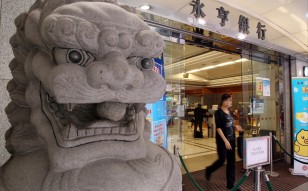Hong Kong banks attract suitors
Guangzhou Yue Xiu makes HK bank move
Chairman and CEO of Wing Hang Bank, Patrick is vice-president of the Hong Kong Institute of Bankers. A University of Toronto graduate, he is also a member of the Dean’s advisory council.
 TAKEOVERS
TAKEOVERSMore than HK$40b to take Wing Hang Bank private, says source
Wing Hang Bank's potential suitors may need to pay more than HK$40 billion to take the city's second-largest family-owned bank private. More than three parties were talking to Wing Hang, a person familiar with the situation said.
4 Dec 2013
Wing Hang Bank is the latest family owned lender in Hong Kong to say it has received a takeover approach, prompting talk of sector-wide consolidation.
The announcement follows news from Hong Kong’s smallest family-run lender Chong Hing Bank on August 7 that it too had attracted a suitor.
Part of the attraction, say M&A bankers, is the potential to use the small Hong Kong banks as a launch pad for cross-border renminbi-denominated business.
Bankers say that Hong Kong’s small banks are ripe for consolidation given the manifold pressures on their profits such as low interest rates and competition.
Mainland Chinese banks have been expanding aggressively in the financial hub since around 2000 and their share of Hong Kong deposits is under pressure. HSBC, Standard Chartered and Hang Seng Bank and Bank of China HK hold about 53% of Hong Kong deposits.
Shares of other family owned banks, Dah Sing and Bank of East Asia, have risen on speculation over the past month that they too will be caught up in consolidation of the sector. However, M&A bankers say the Li family, which controls Bank of East Asia, the largest of the four, are the least likely to agree to a takeover.
Goldman Sachs analysts said in a note that it views Wing Hang as more attractive than Chong Hing for a potential acquirer given its higher profitability, larger scale, more attractive footprint and more valuable relationships with Hong Kong corporate clients.
Wing Hang said in a statement to the Hong Kong Stock Exchange late on Monday that its controlling shareholders, including members of the Fung family and Bank of New York Mellon, had been approached by independent third parties about selling their shares.
Wing Hang said in the statement that discussions are at a preliminary stage and may not result in a deal.
The major shareholders together hold 138 million shares in the bank, or about 45% of the total issued capital. Therefore, if the talks proceed, the suitor would have to make a mandatory general offer to shareholders.
The pattern was similar to Hong Kong’s Chong Hing Bank statement to the stock exchange last month. It said third parties had approached its 50.2% controlling shareholder, Liu Chong Hing Investment, about the possibility of buying its stake but that no firm offer was on the table.
Liu Chong Hing is controlled by the bank’s chairman, Lit-Mo Liu, and his family.
A report said the potential bidder is Yue Xiu Enterprises, which is controlled by the city government of Guangzhou, though it has denied the report.
If either deal goes ahead, it will be the first takeover of a Hong Kong bank since China Merchants Bank paid HK$17 billion for a 46.9% stake in Wing Lung Bank in 2008.
Goldman said the average multiple paid for a Hong Kong based bank in recent decades is 1.93 times book. -- 2013 September 17 FINANCE ASIA
No comments:
Post a Comment